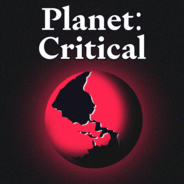Charlie Gardner is a conservationist, activist and writer. An outspoken member of Scientist Rebellion, Charlie left academia last year to focus on raising the climate alarm through civil disobedience and science communication.Charlie joins me to discuss why scientists feel forced to choose activism. After decades of ignored data, warnings and suggestions, these same scientists who have been fighting to understand the crisis are taking to the streets to be heard.We discuss ecological systems, energy policy, corrupt politics, media, Extinction Rebellion, how to engage the public and how people can get involved in the face of disastrous inaction. Just this week, a new report on the state of climate action looked at 40 indicators of change and found not a single one is on track to keep the world from heating to the level at which world leaders promised to try to stop global warming.© Rachel Donald Get full access to Planet: Critical at www.planetcritical.com/subscribe

PolitikWirtschaftTalk
Planet: Critical Folgen
Planet: Critical is the podcast for a world in crisis. We face severe climate, energy, economic and political breakdown. Journalist Rachel Donald interviews those confronting the crisis, revealing what's really going on—and what needs to be done. www.planetcritical.com
Folgen von Planet: Critical
231 Folgen
-
Folge vom 03.11.2022Why Scientists Choose Activism | Charlie Gardner
-
Folge vom 27.10.2022The Most Sustainable Economy in the World | Kate RaworthKate Raworth is a renegade economist focused on making economics fit for 21st century realities. Senior Associate at Oxford University’s Environmental Change Institute, she is the creator of the Doughnut of social and planetary boundaries, and co-founder of Doughnut Economics Action Lab.Kate joins me to discuss Doughnut Economics, her radical theory of a regenerative and distributive economics model which protects both planet and citizens. This is an economy which prioritises well-being, rejects the market principles and profit-maximisation, and enables the principles of community and creativity to flourish.We discuss the fallacy of growth and neoliberalism, the extractivism of “developed” nations, long-termism vs short-termism, and the principles of regeneration and distribution. Kate also shares success stories from the communities and local governments implementing the doughnut model.© Rachel Donald Get full access to Planet: Critical at www.planetcritical.com/subscribe
-
Folge vom 20.10.2022Making Sense of the Meaning Crisis | John VervaekeJohn Vervaeke is a cognitive scientist at the University of Toronto and world renowned thinker, bridging science and spirituality in order to understand the experience of meaningfulness: how to cultivate it and why it’s crucial for human beings.John joins me to discuss “the meaning crisis”—the global phenomenon of modern humans having access to so much, and yet so little profundity. Referencing neurobiology, faith and behavioural science, John explains the impact the meaning crisis is having on individuals all around the world, and what to do about it.We then explore its intersection with the metacrisis, and the historical traditions which are the root of our global energy, economic and climate crisis. Critically, John says we cannot solve the climate crisis without addressing the cultural forces driving the meaning crisisPlanet: Critical investigates why the world is in crisis—and what to do about it.© Rachel Donald Get full access to Planet: Critical at www.planetcritical.com/subscribe
-
Folge vom 13.10.2022Building Democracies for the 21st Century | Matt LeighningerMatt Leighninger is the Head of Democracy Innovation at the National Conference on Citizenship. A pioneer in democracy innovation, Matt’s spent the past 20 years working on improving our political processes, from researching voting reforms to bringing technology into a typically analogue space; he engineered the Text, Talk, Act campaign under Obama’s presidency to encourage active citizenship in the youth.Matt joins me to discuss what we can do about our increasing polarized society, insisting we must move beyond thinking about “saving” democracy and focus our energies on improving it.Explaining we currently run 21st century democracies with 20th century institutions, Matt introduces democratic innovations which are being used all over the world by cities and nations alike. He also explains the limitations elected officials face and the importance of deliberative processes in any democracy.Planet: Critical is 100% independent and reader-funded. If you value it, and have the means, become a paid subscriber today!© Rachel Donald Get full access to Planet: Critical at www.planetcritical.com/subscribe
